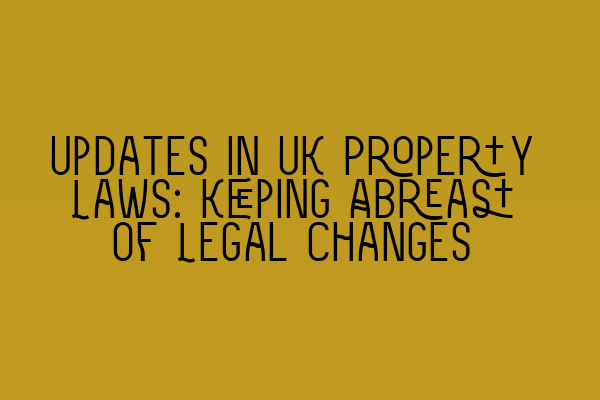**Updates in UK Property Laws: Keeping Abreast of Legal Changes**
As a property owner, investor, or tenant, it is crucial to stay up to date with the ever-changing landscape of UK property laws. Failure to do so can lead to costly legal disputes, missed opportunities, and wasted time and resources. In this blog post, we will discuss some recent updates in UK property laws, ensuring you are well-informed and prepared for any legal issues that may arise.
**1. Energy Efficiency Requirements for Rental Properties**
One major change to UK property laws is the introduction of new energy efficiency requirements for rental properties. From April 1, 2020, all rental properties must have an Energy Performance Certificate (EPC) rating of at least E. This means that landlords will need to make necessary improvements to their properties to ensure compliance.
Failure to comply with these requirements can result in hefty fines and could make your property difficult to let. Therefore, it is important to assess the energy efficiency of your rental properties and make any necessary upgrades to meet the new standards. To learn more about the energy efficiency requirements for rental properties, check out this helpful article: [SQE 1 Practice Exam Questions](https://fqps.co.uk/sqe/sqe1-preparation/mcq-practice-quiz).
**2. Changes to Stamp Duty Land Tax (SDLT)**
Stamp Duty Land Tax (SDLT) is a significant consideration for property buyers in the UK. In response to the COVID-19 pandemic, the UK government introduced temporary changes to SDLT regulations, which have had a considerable impact on the property market.
To boost the market, the government implemented a temporary SDLT holiday, which increased the threshold for paying SDLT on residential properties. From July 8, 2020, to March 31, 2021, the threshold was raised to £500,000, resulting in potential savings for buyers. However, it is essential to keep track of any changes to SDLT regulations, as these temporary measures may be subject to alteration or termination. To find out more about how these changes affect you, read our comprehensive guide: [SQE 1 Practice Mocks FLK1 FLK2](https://fqps.co.uk/sqe/sqe1-preparation/practice-mocks-quiz).
**3. Eviction Ban and Changes to Notice Periods**
COVID-19 has had a significant impact on the rental market, leading to changes in eviction rules and regulations. In an effort to protect tenants from homelessness during the pandemic, the UK government introduced an eviction ban and increased notice periods.
The eviction ban, which was initially put in place in March 2020, has been extended multiple times, with the latest extension currently in effect until May 31, 2021. This means that landlords are restricted from evicting tenants, except in cases of anti-social behavior or rent arrears exceeding six months.
Additionally, notice periods have been extended to provide tenants with more time to find alternative accommodation. Depending on the circumstances, landlords are required to provide notice periods ranging from six to six months. To better understand these changes and how they may impact you, read our article: [SQE 2 Preparation Courses](https://fqps.co.uk/sqe/sqe2-preparation).
**4. Changes to Leasehold Reform**
Leasehold reform has been a hot topic in recent years, with the government seeking to protect leaseholders from onerous and unfair terms. In 2020, the Law Commission published a report proposing changes to leasehold law, including the possibility of allowing leaseholders to extend their leases for up to 990 years.
While these proposed changes are yet to be implemented, it is important to stay informed about potential reforms that may impact existing and future leasehold properties. Understanding your rights and obligations as a leaseholder can help you navigate the complexities of leasehold agreements. To ensure you have the most up-to-date information, we recommend reading our article on leasehold reforms: [SQE 1 Preparation Courses](https://fqps.co.uk/sqe/sqe1-preparation).
**Conclusion**
Staying informed about updates and changes in UK property laws is crucial for property owners, investors, and tenants alike. Failing to do so can lead to legal issues, missed opportunities, and financial losses. By keeping abreast of the latest developments, you can ensure compliance with regulations, make informed decisions, and protect your investments.
To stay updated on important dates and exam requirements for aspiring property solicitors, visit the SRA SQE exam dates page on our website: [SRA SQE Exam Dates](https://fqps.co.uk/sqe/sqe1-sqe2-exam-dates). Remember, knowledge is power, and in the fast-paced world of property law, it is essential to stay ahead of the curve.
